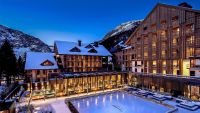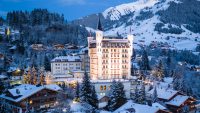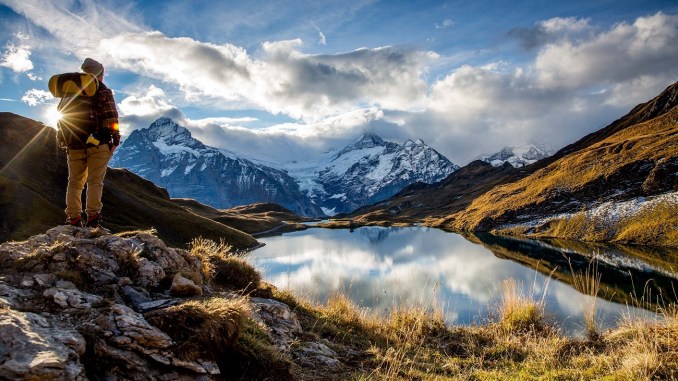Switzerland is a small landlocked country right in the heart of the Alps, bordered by Austria, France, Germany, Italy and Liechtenstein. Although Switzerland has plenty of cultural attractions, with world-class museums, vibrant cities and renowned festivals, most people visit the country for its ravishing mountain scenery. Sitting on the “rooftop” of the continent of Europe, Switzerlands wows its visitors with breahtaking mountain peaks and mammoth glaciers which serve as the source of powerful rivers such as the Rhine and the Rhône. The Swiss Alps, glitzy ski resorts, pristine lakes, and green rolling pastures offer unbeatable winter adventures and summer outdoor experiences. The variety of different sights to see in Switzerland is truly incredible, ranging from giant glaciers, epic mountain peaks, and wild rivers, but also vibrant cities, world-class museums, and scenic train journeys.
Get the most out of your (luxury) trip to Switzerland with my travel guide. Find out more about:
- Best time to visit
- How to get there
- Travel requirements
- Getting around
- Inspiration, highlights, & travel tips
- Suggested itineraries
- Recommended luxury hotels (+ reviews)
BEST TIME TO VISIT
The climate in Switzerland is moderate with no excessive heat, cold or humidity. From July to August the daytime temperature range is 18 to 28 °C (65° – 82° F) and from January to February the range is -2 to 7 °C (28° – 45° F). In the other months, the daytime temperature range is 8 to 15 °C (46° – 59° F). This range may vary depending on the altitude.
Switzerland has four, clearly distinguisable seasons:
- In autumn (September to November), the fruit ripens and the leaves of deciduous trees change colour. Rain is less frequent compared to the summer months, with often long periods of crispy clear nights and sunny, balmy days (known as the Indian summer). It’s a great season for planning outdoor activities in the mountains, although morning fog can be persistent around the lakes and on the central plateau.
- The winters were formerly generally cold and snowy, but now freezing temperatures and snow are no longer the rule, especially in the lowlands. Nowadays, many ski resorts at lower altitude could hardly survive without artificial snow. If you are into winter sports and are looking for guaranteed snow, your best bet is to visit the high Alpine areas from mid-January to mid-March.
- In spring (March to May) the trees blossom and the meadows turn green. Sometimes in April the winter returns for a short period and sometimes there are summer conditions as early as May. In general, the spring months are wetter compared to the autumn months.
- In summer, temperatures rise to 25 to 30°C (77° tot 86° F), sometimes exceeding the 30°C (86°F) mark during hot summers. Summer brings plenty of sunshine but ironically it’s also the rainiest season, especially along the north side of the Alps. July and Augst are also the most popular months to visit Switzerland, with skyrocketing room rates and hordes of tourists.
Overall, the best time to visit Switzerland really depends on what you want to do, see and experience:
- When you want to enjoy mountain hiking or visiting the cities without the crowds, then I’d say the dry and sunny months of September and October are your best bets.
- March is probably the best month for skiing: less crowds compared to February (when school holidays are observed throughout Europe), sunny days, and still excellent prepared slopes.
For a month to month weather report in Switzerland (with regional variations), check this website.
HOW TO GET THERE
Most visitors reach Switzerland by car, plane or train. Although located in the heart of Europe, be aware that Switzerland is not part of the European Union and therefore, border control is still in effect: duties and taxes are applicable at all borders, no matter the mode of transportation you choose to travel to Switzerland.
A large number of airlines fly to/from Switzerland. The country’s main airport is Zürich and will be the point of entry for most visitors, followed by Geneva. There are also smaller airports in Basel, Bern Belp, and Lugano.
- Zürich International Airport, also known as Kloten Airport, is the largest international airport of Switzerland and the principal hub of Swiss International Air Lines. It serves Zürich, Switzerland’s largest city, and, with its surface transport links, much of the rest of the country. Click here for a list of airlines that offer direct flights to Zürich.
- Geneva Internationally Airport (GVA), formerly and still unofficially known as Cointrin Airport, is the international airport of Geneva, the second most populous city in Switzerland. Click here for a list of airlines that offer direct flights to Geneva.
For travelers arriving by road, Switzerland is linked to Europe’s extensive motorway network. However, to be able to drive on Switzerland’s motorways, you need to purchase a Swiss Motorway Vignette (Tax Sticker). This is mandatory for all motorized vehicles and trailers up to a weight of 3,5 t (vehicles weighing more will have to be assessed). The sticker costs EUR 36.50 and can be purchased on gas stations and Autobahnraststätten (motorway service stations and kiosk) shortly before the Swiss border (coming from Germany, France, Austria, Liechtenstein and Italy), at German post offices, from your automobile club, at the Swiss border directly or online from the official Switzerland tourism website.
Visitors wishing to travel to the Alpine nation by train benefit from a multitude of excellent connections. Whether from Germany, Austria, Italy, France or the Netherlands, each day plenty of international trains arrive in Switzerland. TGV Lyria, for example, travels between Paris or Marseille and the Swiss cities of Geneva, Lausanne, Basle and Zurich several times daily. Most international trains offer a dining car or a bistro, power outlets and newspaper service, rendering the journey by rail exceptionally comfortable. The timetable for international trains can be found here.
TRAVEL REQUIREMENTS
In principle, everyone needs a valid travel document to enter Switzerland, although the country may allow EU/EFTA citizens with expired travel documents to cross the border. Travel documents of third-country nationals for a short stay not exceeding 90 days in any period of 180 days, however, must:
- be valid for at least three months after the planned departure from Switzerland and
- have been issued within the previous ten years.
The date of issue of the travel document is what counts, regardless of any official extension. In some cases, you may also need to obtain a visa. To find out if you need to obtain a visa and if there are any requirements for your travel documents, you can check the online Swiss authority.
Make sure you read my 10 tips to plan a worry-free trip.
GETTING AROUND
Switzerland has one of the best public transport systems in the world, and I highly recommend to make use of it, unless you come with your own car. Comprising rail, bus and boat travel, the Swiss Travel System will bring you hassle free from the larger cities to the tiniest hamlet.
- Train travel is by far the best way to travel in Switzerland; it’s economical and popular with both locals and tourists. Swiss trains are modern, clean and comfortable. InterCity trains bring you from city to city in 30 minute or hourly intervals; regional trains – from express to trains that stop at every station – connect you with smaller cities, towns and rural areas. Departure and arrival times are extremely reliable, ensuring that you travel quickly and comfortably to any location.
- Taking a bus cross-country in Switzerland is not as efficient and comfortable as taking a train. However, buses are necessary to reach some of the smaller communities not served by rail. The good news is that a bus stop is always within a few hundred meters of the train station.
- Most Swiss Lakes have regular passenger ships and ferries as well as tourist cruise ships and steamers. They run on a regular schedule just as trains and buses do.
All trains, busses and ships – be they privately operated or by the State – are connected through the Swiss Travel System and you can use one pass for everything. Several passes are available to the traveling public and can be purchased here. Discounts are offered on select cog railways and funiculars, as well as some special events and festivals.
In case you want to rent a car, you’ll be glad to know that all of the major car rental agencies have offices in the main cities and airports. To rent a car in Switzerland, you generally must be at least 20 years old and have a valid driver’s license. Overall, renting a car in Switzerland is more expensive than using the public transport, unless you are traveling with a larger group. Also keep in mind that some high-end hotels, such as the Dolder Grand in Zurich, provide complimentary rental cars or have exclusive car services for their guests at limited or no additional charge.
No matter how you get around in Switzerland, just be sure not to miss two of the world’s most scenic train routes – the Glacier Express and the Bernina Express – which both cross through breathtaking rugged mountain landscapes. This is where you might want to splurge and buy seats in the observation cars for unobstructed view of the Alps.
INSPIRATION, HIGHLIGHTS, & TRAVEL TIPS
There are several reasons why you should put Switzerland on top of your bucket list:
- Skiing in the Alps the winter season
- Outdoor activities (e.g. hiking, biking, etc …) in the summer season
- Enjoying the famous Swiss gastronomy
- Staying at world-class hotels
- Visiting vibrant cities (e.g. Zürich, Geneva, Basel)
- Be wowed by spectacular trains rides (Glacier Express, Bernina Express)
- Tour UNESCO World Heritage Sites (e.g. Jungfrau region)
- Exploring scenic lakes (e.g. Lucerne, Lugano)
The following, comprehensive articles may also inspire you and help you plan a holiday to Switzerland:
- Top 10 best things to do in Switzerland
- Top 10 best hotels & lodges in Switzerland
- Tips & tricks for getting the best deal at a luxury hotel
- Tips & tricks for buying the cheapest plane ticket
SUGGESTED ITINERARIES
Switzerland is a small country and it’s very easy to get around, so it’s possible to see a lot in a time frame of one to two weeks. I hereby share with you a schedule based on my own holidays in Switzerland.
- Day 1 & 2: Zürich: arrival and exploration the old city center and Lake Zürich
- Recommended hotel: The Dolder Grand
- Day 3 & 4: Lake Lucerne: boat cruise on the lake & mountain activities
- Recommended hotel: Buergenstock hotel
- Day 5 & 6: Andermatt: mountain activities
- Recommended hotel: The Chedi Andermatt
- Day 7 & 8: Lake Lugano: boat cruise & relaxation
- Recommended hotel: The View Lugano
- Day 9 & 10: Bern: visit Jungfrau on the way to Bern & exploration of the old town
- Recommended hotel: Bellevue Palace
- Day 11 & 12: Zermatt: mountain activities
- Recommended hotel: The Omnia
- Day 11 & 12: Lausanne & Montreux: relaxation & lakeside activities
- Recommended hotel: Lausanna Palace & Spa
- Day 13 & 14: Geneva: exploration the old city center & departure
- Recommended hotel: Four Seasons
For the planning of your own travel itinerary in Switzerland, I highly recommend the website MySwitzerland.com, which boasts plenty of helpful information. In addition, for more ideas, I suggest the excellent Switzerland itineraries as provided by The Lonely Planet and Frommers.
RECOMMENDED LUXURY HOTELS (+ REVIEWS)
I recommend to visit my top 10 list of the most fabulous hotels in Switzerland if you are eager to know how I rank Switzerland’s top hotels, based my own experience.
Below, you find my reviews of hotels in Switzerland (with pros, cons, & tips to save money per hotel).
 Review of The Dolder Grand Hotel (Zürich, Switzerland)
Review of The Dolder Grand Hotel (Zürich, Switzerland)  Review: The Chedi Andermatt Hotel (Switzerland)
Review: The Chedi Andermatt Hotel (Switzerland)  Review: Gstaad Palace Hotel (Switzerland)
Review: Gstaad Palace Hotel (Switzerland)
*** Follow me on Twitter, Instagram and Facebook for a daily moment of travel inspiration ***



Great article. My family and I been to Basel and Zurich. You are spot on with your recommendations.
Its a great travel guide. Thanks for sharing
such a good article.
I am planning for a family vacation in Switzerland, and luckily found this amazing informational guide.
This guide is very helpful for me to make a good plan for my family travel trip. Thanks.
Kindly send your information. Total list of all the Belmond Hotels as well. Senior Citizens
Thank for sharing .I appreciate your post and the pictures you display are really good.
is it easy to travel in Switzerland using public transport!
I’m constantly searching on the internet for posts that will help me. Too much is clearly to learn about this. I believe you created good quality items in Functions also. Keep working, congrats!